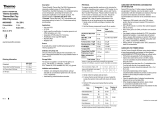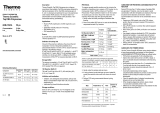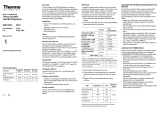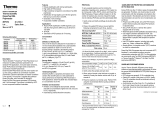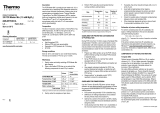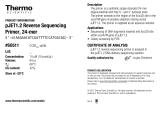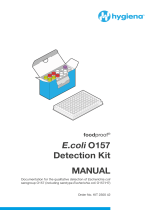Page is loading ...

PRODUCT INFORMATION
Thermo Scientific
ThermoPrime Taq DNA Polymerase
#AB-1301/B 10 x 250 U
Concentration: 5 U/µL
Lot __ Expiry Date __
Store at -20°C
d
www.thermoscientific.com/onebio
Ordering Information
Component
#
AB
-
1301/B
10 × 250 U
#
AB
-
1301/C
20 × 250 U
ThermoPrime Taq DNA Polymerase 5 U/µL
10 × 50 µL 20 × 50 µL
10X
Reaction Buffer IV with
15 mM MgCl
2 10 × 1.5 mL 20 × 1.5 mL
Rev.3
V
Description
Thermo Scientific ThermoPrime Taq DNA Polymerase is an
ultrapure recombinant thermostable Taq DNA polymerase
obtained by high level expression of the Taq DNA
polymerase gene in E. coli. The enzyme exhibits enhanced
thermal stability at DNA denaturation temperatures and can
be shipped at ambient temperature with no loss of activity. It
is licensed and optimized for use in the polymerase chain
reaction (PCR) process. ThermoPrime has 5' to 3'
polymerization and exonuclease activity but lacks 3' to 5'
exonuclease activity (proofreading).
Applications
• Routine PCR amplification of DNA fragments up to
5 kb (1).
• Generation of PCR product for TA cloning.
• DNA labeling (2-4).
• DNA sequencing (5).
Source
E.coli cells with a cloned pol gene from Thermus aquaticus.
Definition of Activity Unit
One unit of the enzyme is defined as the amount that will
incorporate 10 nmol of deoxyribonucleotides into a
polynucleotide fraction in 30 min at 70°C. Enzyme activity is
assayed in the following mixture:
67 mM Tris-HCl (pH 8.8 at 25°C), 6.7 mM MgCl
2
, 1 mM DTT,
50 mM NaCl, 0.1 mg/mL BSA, 0.75 mM activated salmon
milt DNA, 0.2 mM of each dNTP, 0.4 MBq/mL [
3
H]-dTTP.
Incorporation of [
3
H]-dTTP is measured adsorbed on DE-81.
Storage Buffer
The enzyme is supplied in: 20 mM Tris-HCl (pH 8.0 at 25°C),
100 mM KCl, 0.1 mM EDTA, 1 mM DTT, 0.5% Tween
®
20,
0.5% Nonidet
®
P40, 50% (v/v) glycerol.
10X Reaction Buffer IV
750 mM Tris-HCl (pH 8.8 at 25°C), 200 mM (NH
4
)
2
SO
4
,
0.1% (v/v) Tween 20, 15 mM MgCl
2
.
Inhibition and Inactivation
• Inhibitors: ionic detergents (deoxycholate, sarkosyl
and SDS) at concentrations higher than 0.06, 0.02 and
0.01%, respectively (6).
• Inactivated by phenol/chloroform extraction.
PROTOCOL
To prepare several parallel reactions and to minimize the
possibility of pipetting errors, prepare a PCR master mix by
mixing water, buffer, dNTPs, primers and ThermoPrime
Taq DNA Polymerase. Prepare sufficient master mix for
the number of reactions plus one extra. Aliquot the master
mix into individual PCR tubes and then add template DNA.
1. Gently vortex and briefly centrifuge all solutions after
thawing.
2. Place a thin-walled PCR tube on ice and add the following
components for each 25 µL reaction:
*Scale up or down the volume and concentration as appropriate.
3. Gently vortex the samples and spin down.
4. If using a thermal cycler that does not use a heated lid,
overlay the reaction mixture with half volume of mineral
oil.
5. Perform PCR using recommended thermal cycling
conditions:
Step
Temperature,
°C Time
Number of
cycles
Initial D
enaturation
94
2
min
1
Denaturation
94
2
0 s
30-40
Annealing 50-65 30 s
Extension* 72 1 min
Final Extension 72 5 min 1
**
Increase length of time in proportion to size of amplicon. ThermoPrime
Taq DNA Polymerase extends at approximately 1000 bp/min.
GUIDELINES FOR PREVENTING CONTAMINATION
OF PCR REACTION
During PCR more than 10 million copies of template DNA
are generated. Therefore, care must be taken to avoid
contamination with other templates and amplicons that may
be present in the laboratory environment. General
recommendations to lower the risk of contamination are as
follows:
• Prepare your DNA sample, set up the PCR mixture,
perform thermal cycling and analyze PCR products in
separate areas.
• Set up PCR mixtures in a laminar flow cabinet equipped
with an UV lamp.
• Wear fresh gloves for DNA purification and reaction
set up.
• Use reagent containers dedicated for PCR. Use positive
displacement pipettes, or use pipette tips with aerosol
filters to prepare DNA samples and perform PCR set up.
• Use PCR-certified reagents, including high quality water
(e.g., Water, nuclease-free, (#R0581)).
• Always perform “no template control” (NTC) reactions to
check for contamination.
GUIDELINES FOR PRIMER DESIGN
Use the Thermo Scientific REviewer primer design software
at www.thermoscientific.com/reviewer or follow general
recommendations for PCR primer design as outlined below:
• PCR primers are generally 15-30 nucleotides long.
• Optimal GC content of the primer is 40-60%. Ideally, C
and G nucleotides should be distributed uniformly along
the primer.
• Avoid placing more than three G or C nucleotides at the
3’-end to lower the risk of non-specific priming.
• If possible, the primer should terminate with a G or C at
the 3’-end.
• Avoid self-complementary primer regions,
complementarities between the primers and direct primer
repeats to prevent hairpin formation and primer
dimerization.
• Check for possible sites of undesired complementary
between primers and template DNA.
• When designing degenerate primers, place at least
3 conservated nucleotides at the 3’-end.
• Differences in melting temperatures (Tm) between the two
primers should not exceed 5°C.
(continued on reverse page)
Volume
Final
Concentration
10X Reaction Buffer
with
15 mM MgCl
2
2.5 µL 1X
dNTP Mix, 2 mM each (#R0241) 2.5 µL
0.2 mM of each
dNTP
Forward primer, 10 µM
1.25
µL
*
0.5 µM
*
Revers
e primer, 10 µM
1.25
µL
*
0.5 µM
*
Template DNA
0.5
-
10
µL
0.5
-
125 ng
ThermoPrime
Taq
DNA
Polymerase, 5 U/µL 0.125 µL
0.625
U
Water, nuclease
-
free
(#R0581)
to 25
µL
Total volume
25
µL

Estimation of primer melting temperature
For primers containing less than 25 nucleotides, the approx.
melting temperature (Tm) can be calculated using the
following equation:
Tm= 4 (G + C) + 2 (A + T),
where G, C, A, T represent the number of respective
nucleotides in the primer.
If the primer contains more than 25 nucleotides,
specialized computer programs, e.g. REviewer™
(www.thermoscientific.com/reviewer), are recommended to
account for interactions of adjacent bases, effect of salt
concentration, etc.
COMPONENTS OF THE REACTION MIXTURE
Template DNA
Optimal amount of template DNA in the 25 µL reaction
volume is 0.5-125 ng. Higher amount of template increases
the risk of generation of non-specific PCR products. Lower
amount of template reduces the accuracy of the
amplification.
All routine DNA purification methods are suitable for
template preparation e.g., Thermo Scientific GeneJET
Genomic DNA Purification Kit (#K0721) or GeneJET™
Plasmid Miniprep Kit (#K0502). Trace amounts of certain
agents used for DNA purification, such as phenol, EDTA and
proteinase K, can inhibit DNA polymerases. Ethanol
precipitation and repeated washes of the DNA pellet with
70% ethanol normally removes trace contaminants from
DNA samples.
MgCl
2
concentration
Due to the binding of Mg
2+
to dNTPs, primers and DNA
templates, Mg
2+
concentration needs to be optimized for
maximal PCR yield. The recommended concentration range
is 1-4 mM. If the Mg
2+
concentration is too low, the yield of
PCR product could be reduced. On the contrary, non-specific
PCR products may appear and the PCR fidelity may be
reduced if the Mg
2+
concentration is too high.
If the DNA samples contain EDTA or other metal chelators,
the Mg
2+
ion concentration in the PCR mixture should be
increased accordingly (1 molecule of EDTA binds one Mg
2+
).
dNTPs
The recommended final concentration of each dNTP is
0.2 mM. In certain PCR applications, higher dNTP
concentrations may be necessary. Due to the binding of
Mg
2+
to dNTPs, the MgCl
2
concentration needs to be
adjusted accordingly. It is essential to have equal
concentrations of all four nucleotides (dATP, dCTP, dGTP
and dTTP) present in the reaction mixture.
To achieve 0.2 mM concentration of each dNTP in the PCR
mixture, use the following volumes of dNTP mixes:
Volume of
PCR
mixture
dNTP Mix,
2 mM each
(#R0241)
dNTP Mix,
10 mM each
(#R0191)
dNTP Mix,
25 mM each
(#R1121)
50
µL
5
µL
1
µL
0.4
µL
25
µL
2.5
µL
0.5
µL
0.2
µL
20
µL
2
µL
0.4
µL
0.16
µL
Primers
The recommended concentration range of the PCR primers
is 0.1-1 µM. Excessive primer concentrations increase the
probability of mispriming and generation of non-specific PCR
products.
For degenerate primers higher primer concentrations in the
range of 0.3-1 µM are often favorable.
CYCLING PARAMETERS
Initial DNA denaturation
It is essential to completely denature the template DNA at
the beginning of PCR to ensure efficient utilization of the
template during the first amplification cycle. If the GC content
of the template is 50% or less, an initial 1-3 min denaturation
at 94°C is sufficient.
Denaturation
A DNA denaturation time of 20 seconds per cycle at 94°C
is normally sufficient. For GC-rich DNA templates, this step
can be prolonged to 3-4 min.
Primer annealing
The annealing temperature should be 5°C lower than the
melting temperature (Tm) of the primers. Annealing for
30 seconds is normally sufficient. If non-specific PCR
products appear, the annealing temperature should be
optimized stepwise in 1-2°C increments. When additives
which change the melting temperature of the primer-template
complex are used (glycerol, DMSO, formamide and betaine),
the annealing temperature must also be adjusted.
Extension
The optimal extension temperature for ThermoPrime Taq
DNA Polymerase is 70-75°C. The recommended extension
step is 1 min/kb at 72°C.
Number of cycles
The number of cycles may vary depending on the amount of
template DNA in the PCR mixture and the expected PCR
product yield.
If less than 10 copies of the template are present in the
reaction, about 40 cycles are required. For higher template
amounts, 30-35 cycles are sufficient.
Final extension
After the last cycle, it is recommended to incubate the PCR
mixture at 72°C for additional 5-15 min to fill-in any possible
incomplete reaction products. If the PCR product will be
cloned into TA vectors (for instance, using Thermo Scientific
InsTAclone PCR Cloning Kit (#K1213)), the final extension
step may be prolonged to 30 min to ensure the highest
efficiency of 3’-dA tailing of PCR product. If the PCR product
will be used for cloning using Thermo Scientific CloneJET
PCR Cloning Kit (#K1231), the final extension step can be
omitted.
References
1. Innis, M.A., et al., PCR Protocols and Applications: A Laboratory
Manual, Academic, New York, 1989.
2. Celeda, D., et al., PCR amplification and simultaneous digoxigenin
incorporation of long DNA probes for fluorescence in situ hybridization,
BioTechniques, 12, 98-102, 1992.
3. Finckh, U., et al., Producing single-stranded DNA probes with the
Taq DNA polymerase: a high yield protocol, BioTechniques, 10, 35-39,
1991.
4. Yu, H. et al., Cyanine dye dUTP analogs for enzymatic labeling of
DNA probes, Nucleic Acids Res., 22, 3226-3232, 1994.
5. Innis, M.A., et al., DNA sequencing with Thermus aquaticus DNA
polymerase and direct sequencing of polymerase chain reaction-
amplified DNA, Proc. Natl. Acad. Sci. USA, 85, 9436-9440, 1988.
6. Weyant, R.S., et al., Effect of ionic and nonionic detergents on the
Taq polymerase, Biotechniques, 9, 309-308, 1990.
CERTIFICATE OF ANALYSIS
Deoxyribonuclease Assay
No conversion of covalently closed circular DNA to nicked
DNA was detected after incubation of 10 U of ThermoPrime
Taq DNA Polymerase with 1 µg of pUC19 DNA for 4 hours
at 37°C.
Labeled Oligonucleotide (LO) Assay
No detectable degradation of single-stranded and double-
stranded 5‘-[
33
P]-labeled oligonucleotides was observed after
incubation with 10 U of ThermoPrime Taq DNA Polymerase
at 37°C for 4 hours.
Ribonuclease Assay
No contaminating RNase activity was detected after
incubation of 10 U of ThermoPrime Taq DNA Polymerase
with 1 µg of [
3
H]-RNA for 4 hours at 37°C.
Functional Assay
ThermoPrime Taq DNA Polymerase was tested for
amplification of 956 bp single copy gene from human
genomic DNA and for amplification of cDNA.
Quality authorized by: Jurgita Zilinskiene
NOTICE TO PURCHASER:
Use of this product is covered by US Patent No. 6,127,155. The
purchase of this product includes a limited, non-transferable immunity
from suit under the foregoing patent claims for using only this amount of
product for the purchaser’s own internal research. No right under any
other patent claim, no right to perform any patented method and no right
to perform commercial services of any kind, including without limitation
reporting the results of purchaser's activities for a fee or other commercial
consideration, is conveyed expressly, by implication, or by estoppel. This
product is for research use only. Diagnostic uses under Roche patents
require a separate license from Roche. Further information on purchasing
licenses may be obtained by contacting the Director of Licensing, Applied
Biosystems, 850 Lincoln Centre Drive, Foster City, California 94404, USA.
PRODUCT USE LIMITATION
This product is developed, designed and sold exclusively for research
purposes and in vitro use only. The product was not tested for use in
diagnostics or for drug development, nor is it suitable for administration to
humans or animals. Please refer to www.thermoscientific.com/onebio for
Material Safety Data Sheet of the product.
© 2012 Thermo Fisher Scientific, Inc. All rights reserved. Tween is a
registered trademark of ICI America, Inc. Nonidet is a trademark of Shell.
All other trademarks are the property of Thermo Fisher Scientific Inc. and its
subsidiaries.
/


